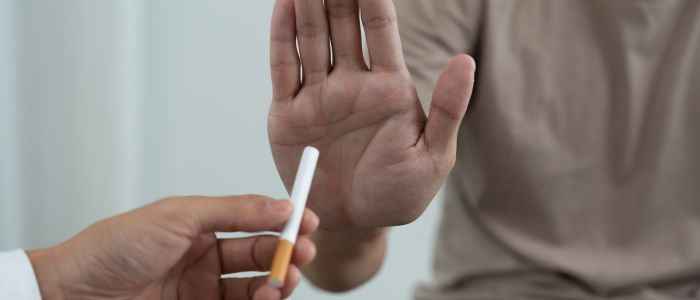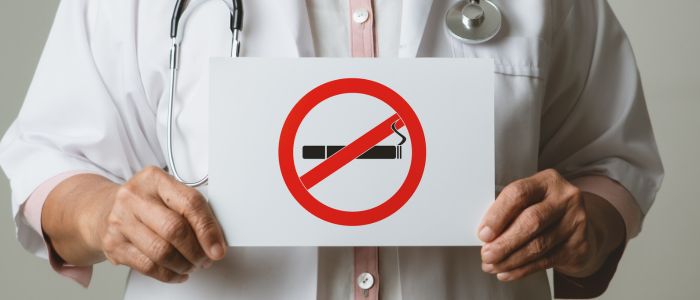
- Smoking's Impact on Surgical Outcomes and Recovery
- Take our Plastic Surgery Quiz to find out if you'd be a good candidate for cosmetic surgery.
- Why is Smoking a Problem for Breast Surgery Patients?
- Specific Risks for Breast Surgery Patients
- Quitting Smoking before Breast Surgery
- Download the Breast Augmentation Guide
- Staying Smoke-Free After Breast Surgery
- Getting Support to Quit Smoking
- Breast Augmentation Before and After Photos
- Breast Surgery Outcomes for Non-Smokers vs Smokers
- Prioritising Your Health
- FAQs about Smoking before or after Breast Surgery
- Further Reading about Breast Surgery with Consultant Plastic Surgeon Anca Breahna
Smoking’s Impact on Surgical Outcomes and Recovery
When you’re preparing for breast surgery, whether it’s a breast lift, breast reduction, or breast augmentation, there are many important factors to consider. One of the important things your surgeon will discuss with you is your smoking habits, and the risks that come with smoking either before or after your breast surgery. In this blog, Consultant Plastic surgeon Anca Breahna will take a closer look at why smoking is such an important issue when it comes to breast surgery, and what you need to know to have the best possible outcome.
Take our Plastic Surgery Quiz to find out if you’d be a good candidate for cosmetic surgery.
Why is Smoking a Problem for Breast Surgery Patients?
Smoking can cause a range of serious complications for anyone undergoing surgery, but it poses particular issues for breast surgery patients. This is because smoking affects the body’s ability to heal properly, as well as increasing the risk of complications during the surgery itself.
When you smoke, the chemicals in tobacco smoke – including nicotine and carbon monoxide – interfere with your body’s natural healing processes. Smoking reduces the amount of oxygen in your bloodstream, which is essential for healing wounds and fighting infection. It also impairs the function of the immune system, making it harder for your body to respond to any problems that arise after surgery.
Additionally, smoking causes blood vessels to constrict, reducing blood flow to the surgical site. This means that the area doesn’t get the nutrients it needs to heal properly. Smokers also tend to have higher levels of inflammation throughout the body, which can delay healing and increase the risk of complications.
Specific Risks for Breast Surgery Patients
For breast surgery patients, the impact of smoking can be particularly serious. Here are some of the risks you need to be aware of:
- Delayed Wound Healing: One of the most common complications of breast surgery in smokers is delayed wound healing. This means that the incisions take much longer to close up and knit together properly. In some cases, the wounds may even reopen or become infected, requiring additional medical intervention.
- Nipple and Skin Loss: Smoking can impair blood flow to the skin and nipple area, which are already vulnerable during breast surgery. This increases the risk of the skin or nipple tissue dying and needing to be removed. This complication is especially common after procedures like breast reduction.
- Implant Complications: For patients having breast augmentation with implants, smoking raises the risk of serious complications like capsular contracture (where the scar tissue around the implant tightens abnormally) or implant failure and rupture.
- Increased Scarring: Smoking inhibits the body’s natural collagen production, which is essential for healthy, smooth scar healing. Smokers are much more likely to develop thick, raised, or irregular scars after breast surgery.
- Infection: The reduced blood flow and impaired immune function caused by smoking make breast surgery patients more prone to developing infections at the surgical site. Infections can be very serious, requiring additional treatment and potentially compromising the results of the surgery.
- Blood Clots: Smokers are at higher risk of developing blood clots, both in the leg (deep vein thrombosis) and in the lungs (pulmonary embolism). These clots can be life-threatening, and are a major concern for any surgical patient.
As you can see, the risks of smoking in relation to breast surgery are significant. Anca will advise you to quit smoking well in advance of your procedure, and to remain smoke-free for a period of time afterwards as well. Let’s look at the timelines and recommendations in more detail:
Quitting Smoking before Breast Surgery
The general recommendation is to quit smoking at least 4-6 weeks before your scheduled breast surgery. This gives your body the best chance to recover some of the damage caused by smoking and improve your healing prospects.
Within just a few weeks of quitting, you’ll start to see benefits:
- After 2-3 weeks, your circulation and oxygen levels will start to improve as the carbon monoxide clears from your bloodstream.
- Within 4 weeks, your immune system function will begin to recover, boosting your ability to fight infection.
- By 6 weeks, your body should be producing more collagen, improving the quality of your post-surgical scarring.
It’s important to note that even if you’ve been a lifelong smoker, quitting in the month or two before your surgery can still make a big difference. Anca may even be willing to postpone your procedure if you need a bit more time to get your smoking under control. The key is to quit as early as possible and remain smoke-free throughout your recovery.
Download the Breast Augmentation Guide

Staying Smoke-Free After Breast Surgery
Once you’ve had your breast surgery, it’s absolutely crucial that you remain smoke-free during the recovery period. Smoking during this time can undo all the good work you put in beforehand, and seriously jeopardise your healing and results.
Anca recommend staying smoke-free for at least 4-6 weeks after your procedure. This timeframe may be even longer for more complex surgeries like breast reduction or breast lift with implants. Anca will advise you on the specific timeline for your case.
During this post-operative period, it’s essential that you avoid any nicotine products, including cigarettes, e-cigarettes, nicotine gum or patches. Your body needs to be in an optimal state to heal properly, and nicotine will continuously undermine this.
Even a single cigarette can have negative effects. Studies have shown that smoking just one cigarette after surgery can triple your risk of developing complications like infection or wound healing problems. It’s really not worth the risk.
Getting Support to Quit Smoking
Quitting smoking can be extremely challenging, especially if you’ve been a long-term smoker. But for the best possible outcome from your breast surgery, it’s essential that you put in the effort.
Anca and her surgical team should be able to provide you with resources and support to help you quit. This might include:
- Referrals to smoking cessation programs or support groups in your local area
- Prescriptions for nicotine replacement therapies like patches, gum or lozenges
- Advice and tips for developing an effective quitting strategy
Don’t be afraid to lean on your loved ones for support as well. Telling friends and family about your plans to quit smoking can help keep you accountable, and they may be able to assist you in practical ways, like ensuring your home is smoke-free.
Remember, your health and the success of your surgery should be the top priority. With the right support and determination, you can absolutely achieve a smoke-free recovery.
Breast Augmentation Before and After Photos
Breast Surgery Outcomes for Non-Smokers vs Smokers
The difference in outcomes between non-smoking and smoking breast surgery patients is quite stark. Studies have consistently shown that non-smokers have:
- Shorter overall recovery times
- Lower rates of surgical complications like infection, delayed healing, or tissue death
- Less visible scarring
- Higher satisfaction with their surgical results
For example, one study found that breast reconstruction patients who smoked had a 50% higher risk of major complications compared to non-smokers. Another investigation discovered that breast augmentation patients who smoked were twice as likely to experience visible scarring.
The bottom line is this: if you want the best possible results from your breast surgery, and the smoothest, safest recovery, quitting smoking is absolutely essential.
Prioritising Your Health
At the end of the day, your health and wellbeing should be the top priority when it comes to any medical procedure. Breast surgery is a significant undertaking, and you want to ensure you’re doing everything in your power to minimise risks and optimise your outcomes.
Quitting smoking, and remaining smoke-free throughout your recovery, is one of the most important steps you can take. It may be challenging, but the benefits to your health, your surgical results, and your long-term quality of life will be profound.
Anca is there to support you on this journey. Don’t hesitate to have an open and honest conversation with her about your smoking habits, and work together to develop an effective quitting plan. With her guidance and your own commitment, you can absolutely achieve the smoke-free recovery you deserve.
FAQs about Smoking before or after Breast Surgery
How long before breast surgery should I quit smoking?
It is generally recommended to quit smoking at least 4-6 weeks prior to any breast surgery procedure. This allows the body time to heal and recover better after the operation. Smoking causes constriction of blood vessels and reduces oxygen and nutrient delivery to tissues. Quitting for several weeks before surgery gives the body time to start repairing this damage and improves the ability of the surgical site to heal properly after the procedure.
What are the risks of smoking after breast reconstruction?
Smoking can significantly impair wound healing and increase the risk of complications like infection, delayed healing, and even tissue necrosis after breast reconstruction surgery. Patients are strongly advised to quit smoking entirely. The chemicals in cigarette smoke interfere with the body’s normal healing processes, leading to a higher chance of complications that can compromise the reconstructive results.
Can I have breast augmentation if I smoke?
Smoking is considered a relative contraindication for breast augmentation. Surgeons may be hesitant to perform the procedure on active smokers due to the elevated risks of complications like capsular contracture and poor wound healing. The constriction of blood vessels and reduced oxygen supply caused by smoking can negatively impact the body’s ability to heal properly around the implants. This increases the chance of complications that can affect the final aesthetic outcome.
How does nicotine affect breast implant results?
Nicotine and other chemicals in cigarette smoke can interfere with blood flow and oxygen supply, leading to an increased chance of implant-related complications like implant rippling, extrusion, and capsular contracture. Smoking reduces circulation to the surgical site, which is vital for proper healing around the implant. This can cause the formation of excessive scar tissue and contracture of the capsule, distorting the shape and feel of the implants.
What are the benefits of quitting smoking before breast surgery?
Quitting smoking before any breast procedure can significantly improve surgical outcomes. It reduces the risk of complications, promotes better wound healing, and leads to more aesthetically pleasing and long-lasting results for the patient. When patients stop smoking several weeks before their surgery, it allows their body’s natural healing processes to start repairing the damage caused by cigarette use. This results in a lower chance of issues like infection, delayed healing, and tissue death after the procedure. Ultimately, quitting smoking enhances the patient’s ability to recover well and achieve their desired aesthetic goals.
Medical References
- Smoking as a Risk Factor for Surgical Site Complications in Implant-Based Breast Surgery – PubMed – https://www.ncbi.nlm.nih.gov/pmc/articles/PMC8599112/
- Smokers at Higher Risk of Complications from Breast Reconstruction Surgery – American Cancer Society – https://acsjournals.onlinelibrary.wiley.com/doi/full/10.3322/canjclin.51.3.149
- Effects of preoperative smoking cessation on the incidence and risk of intraoperative and postoperative complications in adult smokers – PubMed – https://www.ncbi.nlm.nih.gov/pmc/articles/PMC2563647/
- Can smoking before surgery be fatal? – Medical News Today – https://www.medicalnewstoday.com/articles/can-smoking-before-surgery-kill-you
- It’s Never Too Late for Breast Cancer Patients to Quit Smoking – The American College of Surgeons – https://www.facs.org/for-medical-professionals/news-publications/news-and-articles/bulletin/2023/october-2023-volume-108-issue-10/it-s-never-too-late-for-breast-cancer-patients-to-quit-smoking/
Further Reading about Breast Surgery with Consultant Plastic Surgeon Anca Breahna
- Read more about All about Perfect Breasts and How to Get Them
- Read more about How to Fix Saggy Breasts – Breast Uplift, Breast Implants or Both
- Read more about What are Tuberous Breasts and How to Correct Them
- Read more about How to Get Firmer Breasts
- Read more about Breast Enlargement Pills and Creams




 Ms Anca Breahna, PhD, MSc, FEBOPRAS, FRCS (Plast) is a highly regarded Consultant Plastic Surgeon specialising in the field of Aesthetic and Reconstructive Plastic Surgery. Anca performs a range of
Ms Anca Breahna, PhD, MSc, FEBOPRAS, FRCS (Plast) is a highly regarded Consultant Plastic Surgeon specialising in the field of Aesthetic and Reconstructive Plastic Surgery. Anca performs a range of 